
.png)
The Caribbean Philosophical Association is pleased to announce the 2022 recipients of the association’s awards for contributions to philosophical thought, literature, and mentorship:
Frantz Fanon Lifetime Achievement Award
Fanon Outstanding Activist Intellectual and Scholar Award
Nicolás Cristóbal Guillén Batista Lifetime Achievement Award
Stuart Hall Mentorship Award
Fanon Outstanding Book Award
Nicolás Cristóbal Guillén Batista Outstanding Book Award
Nicolás Cristóbal Guillén Batista Outstanding Book Award
The selection of awardees is made annually by the Caribbean Philosophical Association’s Awards Committee, which consists of all prior recipients of the Frantz Fanon, the Nicolás Guillén, and the Stuart Hall Awards, an appointed senior scholar, and two appointed junior scholars. For more information, please consult:
The awards will be formally conferred at a special ceremony at the Caribbean Philosophical Association’s annual conference, which will be held this year at Michigan State University on October 27–29th. The theme will be “Shifting the Geography of Reason XX: Philosophy, Literature, and Liberation.”
Each recipient is being acknowledged for the importance of their work for the Caribbean Philosophical Association’s ongoing project of shifting the geography of reason. In the words of 2014’s Guillén Lifetime Achievement Laureate Ngũgĩ wa Thiong’o:
[We] celebrate the new recipients of the awards; sisi kwa sisi (we for us/for one another/from us to us), we used to say in Kiswahili.
Frantz Fanon Lifetime Achievement Award
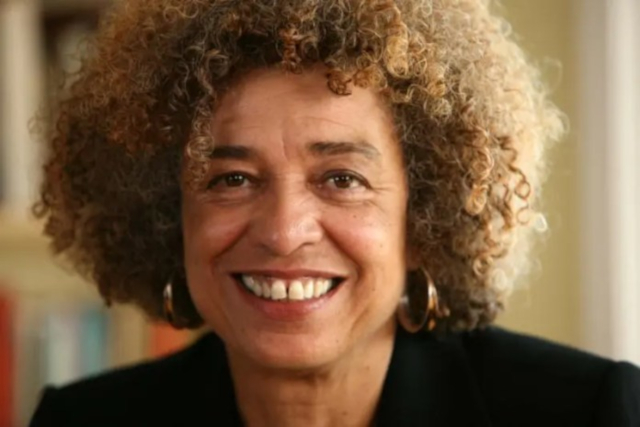
Angela Y. Davis is a living icon and a source of inspiration for people struggling for dignity, equality, freedom, and respect—especially those whom Fanon called the Damned of the Earth—worldwide. The historical importance of her life and thought is attested to by the many studies of both in universities, community centers, and political organizations across the globe. Her work as a gifted young philosopher who was a student of the great critical theorist Herbert Marcuse in the 1960s and an activist with the Black Panther Party and varieties of other revolutionary groups, through to her dedicated work against all forms of dehumanization, for which she faced celebrated battles against unjust criminal justice systems and the carceral state, places her among those dedicated to shifting the geography of reason and access. Her writings reveal a meeting of thought and praxis so seamless that they could be described as thought-practice or practice-thought. The Caribbean Philosophical Association Awards Committee stated in their letter to Dr. Davis that she is selected for this award “not only for the political and theoretical richness of [her] writings but also for [her] crucial role as an activist and institution-builder over the years not only in United States but also across the globe.”
President of the Caribbean Philosophical Association, Dr. Hanétha Vété-Congolo, adds: “Only euphemisms can be used to translate what we and the world owe Professor Angela Y. Davis. She has not only enabled us to benefit from objective intellectual and philosophical paradigms to situate our own thinking but also offered us an outstanding praxis of human solidarity with the damnés of the world. We are forever beholden to her.”
Frantz Fanon Lifetime Achievement Award
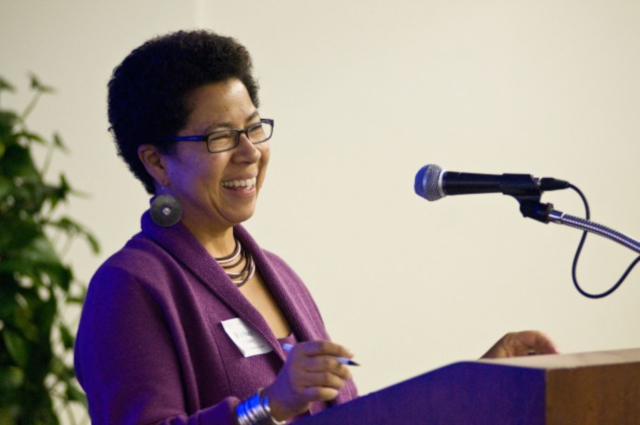
UIC LAS “Meeting of the Minds” panel discussion “1968”
Barbara Ransby is a world-renown historian and political activist whose scholarship on the legendary Ella Baker, Eslanda Cardoza Goode Robeson, and Black Lives Matter is among those that brought to the fore the importance of understanding Black female leadership in the struggle for democracy and liberation in the United States and beyond. Her work as an organizer is courageous, both in addressing threats to Black communities from without and within. The Awards Committee states that Professor Ransby is “selected for this award because of the historical and political importance of her writings, her tireless work as an institution-builder and activist, and the integrity she brings to every project in which she is involved.” Adds President Hanétha Vété-Congolo: “Professor Barbara Ransby is one of our leading womanist thinkers and leaders. One who allies thought with action. She is a powerfully stimulating inspiration. Congratulations to Professor Ransby, and we thank her for showing us the way.”
Frantz Fanon Lifetime Achievement Award
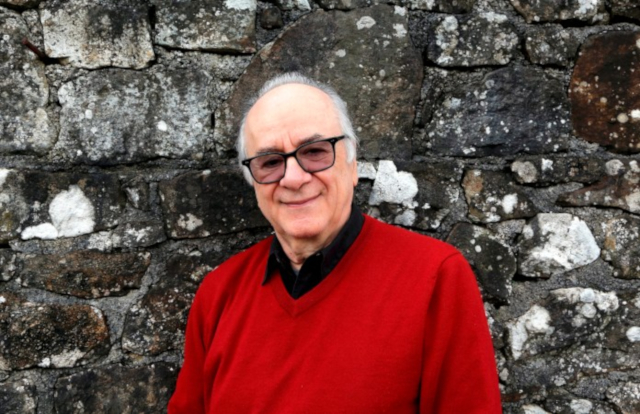
Boaventura de Sousa Santos is a legendary critical theorist, legal theorist, philosopher, sociologist, and activist in struggles not only against material forms of colonization and exploitation but also what he calls “epistemicide.” His work as an activist and institution-builder includes projects such as ALICE: Leading Europe to a New Way of Sharing the World Experiences in his native country of Portugal to many coalition projects with Black and Indigenous peoples across the Global South. An intellectual proud of his humble beginnings among the Portuguese peasantry and one who is well-aware of what is involved in struggles against fascism, Professor de Sousa Santos has dedicated his life to fighting against all forms of oppression while fighting for the affirmation of livable life. His work on southern epistemologies speaks directly to the Caribbean Philosophical Association’s project of shifting the geography of reason and Fanon’s call to build new concepts in the struggle to set afoot a better world. The Awards Committee states his selection as “exemplifying the spirit of Fanon’s commitment to les Damnés de la terre and the urgency of building houses for living, courageous thought.”
President Hanétha Vété-Congolo adds: “For never stopping to teach us that our pluriverse is our shared space capable of elastic expansion at will where we each and all have legitimacy, Professor Boaventura de Sousa Santos is a voice that must never extinguish. Thank you, Professor Boaventura de Sousa Santos, for your resilient commitment. “
Fanon Outstanding Activist Intellectual and Scholar Award

Amanda Alexander is Founding Executive Director of the Detroit Justice Center. A dedicated activist whose work as a historian, legal activist, and institution-builder spans more than two decades across southern Africa and North America, Alexander has been involved in projects ranging from the Square One Project to reimagine social justice to the Boggs Center. She is among a group of young activist intellectuals who bridge gaps between the global and the local through working with and among those at the proverbial bottom of society from South Africa to the United States. Her scholarly work includes not only writings on Steve Bantu Biko and Black consciousness but also, through her appointment at the University of Michigan Law School, founding the Prison & Family Justice Project to provide legal representation to incarcerated parents and advocate for families divided by the prison and foster care systems. Alexander is also on the steering committee for Law for Black Lives. The Awards Committee selected Alexander for this award because, “like the precocious Fanon, who dedicated his professional work as a psychiatrist to addressing problems of societies marked by the maledictions of colonialism, Alexander brings her professional training as an attorney and historian to addressing the institutional inequities of a society marked by colonialism, racism, sexism, and more.”
President Hanétha Vété-Congolo agrees: “Because the state of our world and our lived experience demonstrate that justice can poignantly be served by activism, Amanda Alexander’s work is undeniably useful. It must be acknowledged and congratulated. Thank you, Amanda Alexander, for your commitment to social justice and the creative energy you bring to building institutions for social change.”
Nicolás Cristóbal Guillén Batista Lifetime Achievement Award
.jpg)
Beverly Guy-Sheftall is a living legend in Black feminist scholarship and activism. The Anna Julia Cooper Professor of Women’s Studies and English at Spelman College, her work exemplifies the namesake of that chair. Her books include the groundbreaking Words of Fire: An Anthology of African American Feminist Thought (1995), and she is a featured feminist in documentaries and organizations devoted to social transformation in the United States and beyond. The Awards Committee selected Professor Guy-Sheftall because “her life and work bring together literature, philosophical thought, and political praxis in a seamless fusion in the spirit of luminaries such as Cooper, Guillén, Hansberry, and Hughes, giants whose understanding of what it means to be committed intellectuals in the spirit of shifting the geography of reason in the fight against oppression.” In the words of the Caribbean Philosophical Association’s President Hanétha Vété-Congolo: “Spending one’s life at work to offer life changing insights on the experience of Black women in the United States is no pleasure cruise. Professor Beverly Guy Sheftall did it. We thank her for standing firm.”
Stuart Hall Mentorship Award
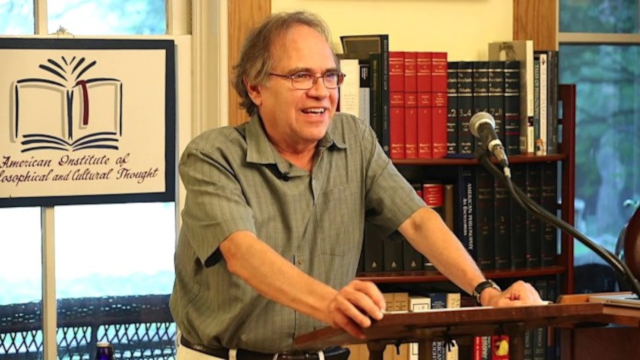
Kenneth Stikkers is Professor of Philosophy and Africana Studies at Southern Illinois University. A modest and committed philosopher and teacher, he has mentored generations of students whom the academy would have ignored but for his dedication to making sure they were able to gain their proverbial wings and take flight. Beyond his students’ fame is the set of testimonies they sent about their mentor, which impressed the Awards Committee greatly. Here are some short excerpts:
I did not have a sense that philosophy was for me. That was until I took Dr. Stikkers’s class on Critical Race Theory and was introduced to Black Skin, WhiteMasks by Frantz Fanon. That moment forever changed my development as an intellectual. For the first time I felt I was reading someone who was speaking directly to my experience. I experienced firsthand that my experiences as a Black man were worthy of the deepest philosophical scrutiny. It was from that moment onward that I could see myself as a philosopher.… I know for a fact that his support has laid the foundations for many new philosophers to come who will be working to shift the geography of reason (Darian Spearman, UCONN).
“[Professor Stikkers’s] convinced me that I could contribute to the shifting of the geography of reason away from Europe and to diversifying the philosophy curriculum in North American philosophy departments. He was among the first people who showed me that doing these two things was a viable option for me. I have been doing these two things unapologetically for nearly 15 years now. I will forever remain grateful to him for showing me this option. (Dwayne Tunstall, Grand Valley State University)
…[In] addition to remembering the human warmth of Professor Stikkers and his sense of humor, I observed that he was not afraid to talk to me about his intellectual and personal concerns. In my opinion, this type of approach is typical of people who have never seen in philosophy a place to overcome others or boast of their triumphs or merits, but rather of someone who recognizes that the philosophical path is a path that is constructed in community, recognizing ourselves as human, fragile and sensitive, but with an invaluable potential to transcend, to dream, for something that I do today in philosophy as a university professor. (Juan Alejandro Chindoy, Universidad de Caldas, Manizales, Colombia)
[Professor Stikkers’s] friendship and mentorship were not the typical white savior narrative many philosophers pride themselves on in philosophy…. [His] mentorship was rooted in his belief that Black philosophy was a serious academic and disciplinary endeavor that required the best minds and talented young Black people to develop the field in the future…. Year after year, Dr. Stikkers worked to cultivate a respect for and knowledge of Black philosophers. He challenged American philosophers to think about the consequences that racism and Blackness have not only for Black people’s lives, but white people’s stake in democracy and “doing philosophy.” … Generations of young philosophers are indebted to the work and efforts of Dr. Stikkers. He has dedicated his career to the cultivation of young philosophers and made a special effort to support and develop Africana/Black philosophy as an area of research. While there is no denying the lack of racial and ethnic diversity in philosophy, [Professor Stikkers] has dedicated his life to changing this reality. His work and service have changed our discipline for the better and are well deserving of the Stuart Hall Outstanding Mentor Award for his efforts. (Tommy Curry, University of Edinburgh)
Adds President Hanétha Vété-Congolo: “Mentorship is one way to achieve a shift in the geography or reason. The skills, dedication, and depth of heart it requires are often kept silence. Professor Ken Stikkers is one who compels us to acknowledge them. May he be thanked for that.”
Fanon Outstanding Book Award
.png) |
.png) |
Dylan Rodríguez, White Reconstruction: Domestic Warfare and the Logics of Genocide. Fordham University Press, 2021.
The Awards Committee was impressed by the referee reports on this powerful historical and theoretical study of reinventions of white supremacy in U.S. history. Jeremy Glick, a member of the Awards Committee, whose 2017 book The Black Radical Tragic was the Guillén Outstanding Book Award winner, wrote: “I just want to say on record how much I admire Dylan Rodríguez’s book and him as a person, activist, and scholar.” The referees attested to the excellence of the scholarship and the global critical thought it embodies, stating, for example, that “White Reconstruction challenges us to think more radically both by eschewing reformist ideas and terms and by learning from the creative genius of liberationist insurgencies that call us to abolitionist struggle,” and “Refusing to imagine the historian’s concerns as at odds with those of the theorist, Rodríguez shows white supremacy reinventing its forms without losing sight of its imperatives.” President Hanétha Vété-Congolo adds: “White Reconstruction is in the spirit of Fanon’s action: unveiling hidden destructuring systems to better combat them. Through it, Professor Dylan Rodríguez is contributing to shifting the geography of reason. The intellectual community is thankful.”
Dr. Rodríguez is Professor of Media & Cultural Studies at the University of California at Irvine and former President of the American Studies Association.
Nicolás Cristóbal Guillén Batista Outstanding Book Award
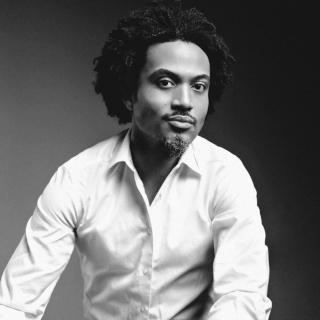 |
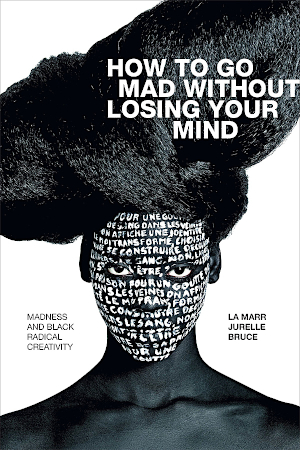 |
La Marr Jurelle Bruce, How to Go Mad Without Losing Your Mind. Duke University Press, 2021.
In the words of one of the anonymous referees: “In this balmy work, Bruce deftly shifts the geography of reason into mad terrain by taking madness to be both an object of analysis and as a methodology…. Rather than holding unto reason or collapsing into unreason, How to Go Mad Without Losing Your Mind asks us to both hold tight and let go in the practice of mad methodology. Madness need not be averted or silenced. For this lesson—and many more—I support [this book] receiving the Nicolás Cristóbal Guillén Batista Philosophical Literature Prize.” From another: “This poignant study raises paradoxes of madness in societies that make it unreasonable for so many among the Damned of the earth to question conditions of their degradation. Bruce drives critical reflection home to levels beneath appearance into the realms of quandary, creativity, and, joyously, possibility.” The Awards Committee was clearly impressed. “Congratulation,” adds President Hanétha Vété-Congolo, “to La Marr Jurelle Bruce for this award and the philosophico-poetic gem that allowed it.”
Dr. La Marr Jurelle Bruce is an interdisciplinary humanities scholar, cultural and literary critic, Black/black studies devotee, Bronx native, first-generation college graduate, and Associate Professor of American Studies at the University of Maryland, College Park.
Nicolás Cristóbal Guillén Batista Outstanding Book Award
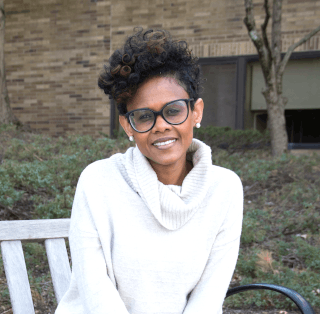 |
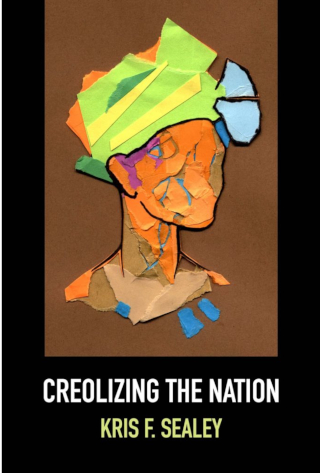 |
Kris Sealey, Creolizing the Nation. Northwestern University Press, 2021.
One referee referred to Creolizing the Nation as “A valiant effort to rescue the concept and role of the nation from those who would use it to marginalize and abuse… Her rigorous yet engaging analysis allows her to offer a vision of the nation as a resource through which it becomes possible to build a more just, and ultimately more human community. This is an important and timely book.” Another attests to the importance of chapters 4 and 5, which “offer novel contributions by bringing a creative and attentive reading of debates in Latina feminism to bear on Glissantian créolité.” President Hanétha Vété-Congolo states: “Professor Kris Sealey is surely offering food for thoughts. This calls but for thanks and congratulations.”
Dr. Sealey is Professor of Philosophy at Fairfield University, where she also serves as Co-director of the Black Studies Program and Associate Director of the Humanities Institute.
Lewis R. Gordon is Professor and Head of the Department of Philosophy at UCONN-Storrs, Honorary President of the Global Center for Advanced Studies, Chair of the Committee on Public Philosophy for the American Philosophical Association, and Chair of the Awards Committee for the Caribbean Philosophical Association. His books include Freedom, Justice, and Decolonization (2021) and Fear of Black Consciousness (2022).
Conteúdo Original por Black Issues in Philosophy